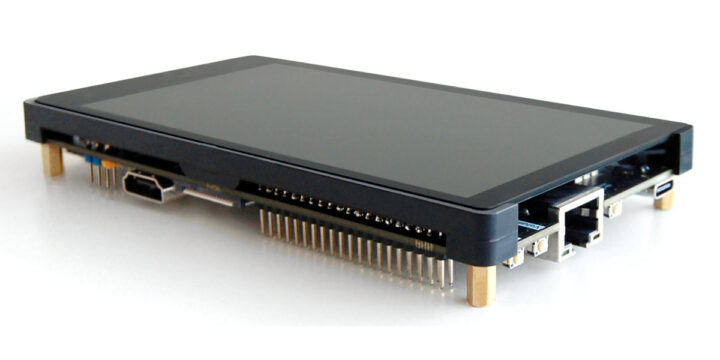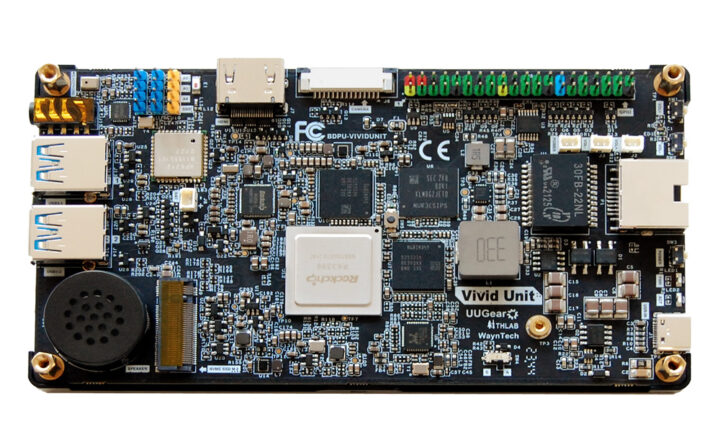UUGear’s Vivid Unit is a low-profile SBC with an integrated 5.5-inch 1280×720 touchscreen display powered by the older Rockchip RK3399 hexa-core Cortex-A72/A53 SoC coupled with 4GB RAM and a 32GB eMMC flash.
The board also comes with gigabit Ethernet and WiFi 4 connectivity, supports M.2 NVMe storage, offers HDMI output and a MIPI CSI camera input, integrates a speaker and a stereo microphone, and allows for expansion through a 40-pin GPIO header and other headers for ADC and USB.
Vivid Unit specifications:
- SoC – Rockchip RK3399
- CPU – Hexa-core big.LITTLE processor with 2x Arm Cortex-A72 cores up to 1.8GHz, 4x Arm Cortex-A53 cores up to 1.4GHz
- GPU – Arm Mali-T860MP4 GPU
- AI accelerator – 6 TOPS NPU
- System Memory – 4GB LPDDR4
- Storage
- 32GB eMMC flash
- M.2 socket for NVMe SSD
- Display – 5.5-inch touchscreen display with 1280×720 resolution
- Video Output – HDMI port
- Camera Input – MIPI CSI camera connector
- Audio
- Built-in speaker and stereo microphone
- 3.5mm headphone jack
- Networking
- Low-profile gigabit Ethernet RJ45 connector
- 2.4GHz WiFi 4 (802.11b/g/n) and Bluetooth 4.1 wireless connectivity
- USB – 2x USB 3.1 Type-A ports, 2x USB 2.0 interfaces via 4-pin headers (blue), 1x USB Type-C for power and flashing the OS
- Expansion
- 40-pin color-coded GPIO header with SPI, I2C, UART, SDIO, and ADC interfaces
- 4-pin ADC header (yellow)
- Misc
- Power, Volume +/-, and MASKROM buttons
- Power button connector, Volume +/- button connectors
- Power LED (red), Act LED (green)
- RTC battery connector
- Power Supply – 5V DC via USB-C port or 48V via PoE
- Dimensions – 146 x 78.2 x 19mm
- Weight – 175 grams
The Vivid Unit SBC ships with a touchscreen display, two braces, and M3 screws and standoffs. Few new products ship with the Rockchip RK3399 as it has been displaced by the newer Rockchip RK3568 or RK3588 processors, but it does benefit from a mature software stack which I initially assumed may be why UUGear selected the SoC for their new product.
They offer two OS images for the Vivid Unit: Debian 11 and Debian 11 with RetroPie preinstalled, so it’s not the latest Debian 12. The low-level software has been uploaded on GitHub, and what we have there is Linux 5.10.110 and u-boot 2017.09, so not exactly mainline stuff… Two more repositories are available for the Vivid Unit for the VGP GPIO CLI/GUI utility and the VSA screen assistant. You’ll find some more documentation on the product page.
The video demo above shows the Vivid Unit used as a voice assistant relying on Google Speech Recognition, Google Text-to-Speech, and ChatGPT-4. Other applications for the system include Smart Home automation, robotics, industrial control systems, portable computing, and retro gaming.
Dun Cat B.V (UUGear) sells the Vivid Unit for 99 Euros on its own e-shop.

Jean-Luc started CNX Software in 2010 as a part-time endeavor, before quitting his job as a software engineering manager, and starting to write daily news, and reviews full time later in 2011.
Support CNX Software! Donate via cryptocurrencies, become a Patron on Patreon, or purchase goods on Amazon or Aliexpress






